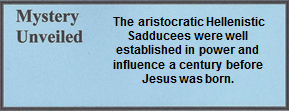03.05.14 63 B.C. Honi, the Jewish Miracle Worker killed
During the civil war a popular miracle worker by the name of Onias ha-M’agel, a/k/a “Honi, the Circle-Drawer,” was stoned to death.[1] He was believed to have the divine power to cause the clouds to rain. During one severe drought, he drew a circle in the dust, sat in that circle and prayed until it rained. It did, and for this, he became a legendary folk hero to the point that religious leaders in the temple could not agree as to what to do with him. The writers of the Mishnah wrote these reflective thoughts about him:
Once they said to Onias [a/k/a Honi] the Circle-maker, “Pray that rain may fall.” He answered, “Go out and bring in the Passover ovens that they may not be softened.”[2]
He prayed but the rain did not fall. What did he do? He drew a circle and stood within it and said before God, “O Lord of the world, your children have turned their faces to me, for I am like a son of the house before you. I swear by your great name that I will not stir hence until you have pity on your children.” Rain began to fall drop by drop. He said, “Not for such rain have I prayed, but for rain that will fill cisterns, pits, and caverns. “It began to rain with violence. He said, Not for such rain have I prayed, but for rain of goodwill, blessings, and graciousness.” Then it rained in moderation [and continued] until the Israelites went up from Jerusalem to the Temple Mount because of the rain.
Mishnah, Taanit 3:8 [3]
But the aristocratic Sadducees and leading Pharisees were outraged at Honi, because in their thinking, it was unimaginable that God would work through a common individual rather than through one of them since they were the experts on the law. Therefore, it is easy to understand why they would not accept Jesus – a Nazarite who also had no formal theological training. Yet while they criticized Honi, they were at a loss as to what to do,
Simeon B. Shetah sent to him [Onias/Honi, saying], “Had you not been Onias, I would have pronounced a ban against you! But what shall I do to you? You importunest God and he performs your will; and of you the Scripture says, ‘Let your father and your mother be glad, and let her that bare you rejoice.’ ”
Mishnah, Taanit 3:8[4]
The religious leaders could not excommunicate him because he became a folk hero. The problems they had with Honi would pale in light of the coming Jesus of Nazareth, who would minister only a century later. There is no mention of a possible excommunication of Jesus; it is not mentioned once in the Bible although some scholars have suggested that it may have occurred in one or more local synagogues.[5] Yet if the synagogue leaders felt it was necessary to discipline, excommunication would have been the method of choice. However, this act would have been disastrous for the leadership since both Honi and Jesus had become extremely popular with the people. The question is of course, how does one remove an individual from the synagogue who is loved by hordes of people and has thousands of them listening to his teachings? Hence, they eventually entertained the unthinkable: to kill him quickly and as secretly as possible.[6]
Josephus also recorded the account of Honi, leaving modern scholarship with evidence that righteous men did in fact perform miracles in the Inter-Testamental Period. Honi was never considered to be a prophet, only a godly man who performed miracles, and as many other godly men, paid the ultimate price. Note the words of Josephus:
Now there was one, whose name was Onias (or Honi), a righteous man he was, and beloved of God to put an end to the intense heat, and whose prayers God had heard and had sent them rain. This man hid himself because he saw that this sedition would last awhile. However, they brought him to the Jewish camp and desired, that as by his prayers he had once put an end to the drought so he in like manner make imprecations on Astrobulus and those of his faction. And when, upon his refusal, and the excuse that he made, he was still by the multitude compelled to speak, he stood up in the midst of them and said, “O God, the king of the whole world! Since those that stand now with me are your people, and those that are besieged are also your priests, I entreat you that thou wilt neither harken to the prayers of those against these nor to bring to effect what these pray against.” Where upon such wicked Jews as stood before him, as soon as he made this prayer, stoned him to death.
Josephus, Antiquities 14.2.1 (22-24)[7]
Clearly, Honi left a dynamic impression that was later remembered by Josephus and recorded in the Mishnah. Critics tend to lay aside any significance of Honi because of legendary stories that arose, such as his 70-year sleep. But these historical accounts do state that the Sadducees were very willing to kill a godly man who threatened their aristocratic position. This is precisely what they would do later to Jesus.

[1]. Josephus, Antiquies 14.2.1 (see below); Moseley, Yeshua: A Guide to the Real Jesus and the Original Church. 121.
[2]. Ovens were made of clay and, if outside, would soften and collapse by the rain.
[3]. See also commentary on Honi as depicted in the Babylonian Talmud Ta’anit 23a in Safrai,“Jesus and His Disciples: The Beginnings of Their Organization” 105. Parenthesis clarification mine.
[4]. Proverbs 23:25. Clarification mine.
[5]. Jeremias, Jerusalem in the Time of Jesus. 308.
[6]. Neusner and Green, eds., Dictonary of Judaism. 300.
[7]. Insert mine.